How do I get water ? A photovoice project with homeless people in Cape Town (CBD & Claremont)
Cape Town has several homeless people that the U-Turn report (Hopkins, Reaper, Vos, & Brough, 2020) estimates at over 14,000. As various studies have shown, homelessness takes many different and sometimes non-visible forms so it is difficult to count the number of homeless. In Cape Town, some homeless people are visible, living on pavements or in public parks, often in shacks made of cardboard and plastic, which are sometimes clustered together.
There are few public water sources in Cape Town. The participatory research design, providing the homeless participants with cameras, allowed the people involved to document how they cope with the lack of access to water. This project has investigated access to water for homeless people in two Cape Town suburbs: Central Business Area and Claremont. It was conducted between March and May 2023.
Human rights to water and sanitation were explicitly recognised on 28 July 2010, through Resolution 64/292, by the United Nations General Assembly, as essential to the realisation of all human rights. In November 2002, the Committee on Economic, Social and Cultural Rights adopted General Comment No. 15 on the right to water. Article 1 states that “The human right to water is indispensable for leading a life in human dignity. It is a prerequisite for the realisation of other human rights” (p.1). Comment No. 15 also defined the right to water as the right of everyone to sufficient, safe, acceptable and physically accessible and affordable water for personal and domestic uses.
A human rights-based approach (HRBA) to health – understood as a state of physical, mental and social well-being (WHO) supported the research project.

Portia: You can take a bucket - take the water, take a bucket and go sit in your corner. You don’t have to wash and stand there. No, we also swim! This is where we all swim.

Ernest: Yes, this is the debris I found here. It was early in the morning now I finish now, here’s my teaspoon, my coffee, the water that I fetch when I put it here, my tea.

Nicolas: I used to wash my clothes I go there. I put the soap, I’m going to have to find something to wash it in, inside a bag thing and then I take it out then I rinse it then I go.

Ernest: You cannot see me when I’m inside there because I’m inside by the trees. The trees help me to hide me, the trees hide me, you cannot see me. I must protect otherwise I die. You see, it’s now I open, that is my mattress, it’s just only my mattress, and then here’s my blanket.
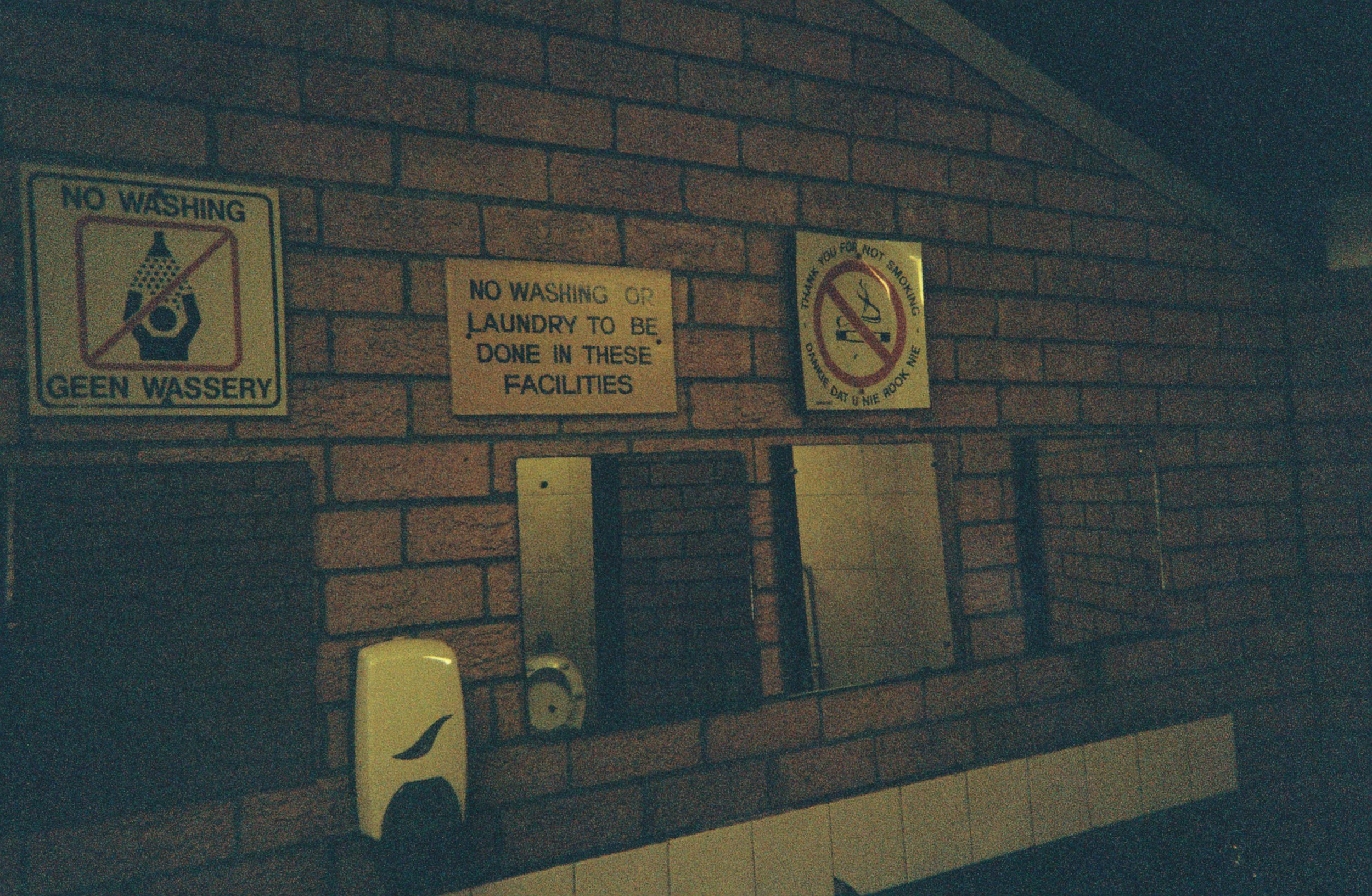
Gideon: Then this picture is by the lighthouse, they have a sign there that says you can’t do washing and you can’t do anything there except use the bathroom, but this basin is in one of the toilet so people use it to do washing. You can hear them if you inside. I’ve used it, if you’re really desperate.

Ernest: When I’m finished to wash my body, I wash my clothes. If I have no water I have no life. I must find water to find the life. Water is my life
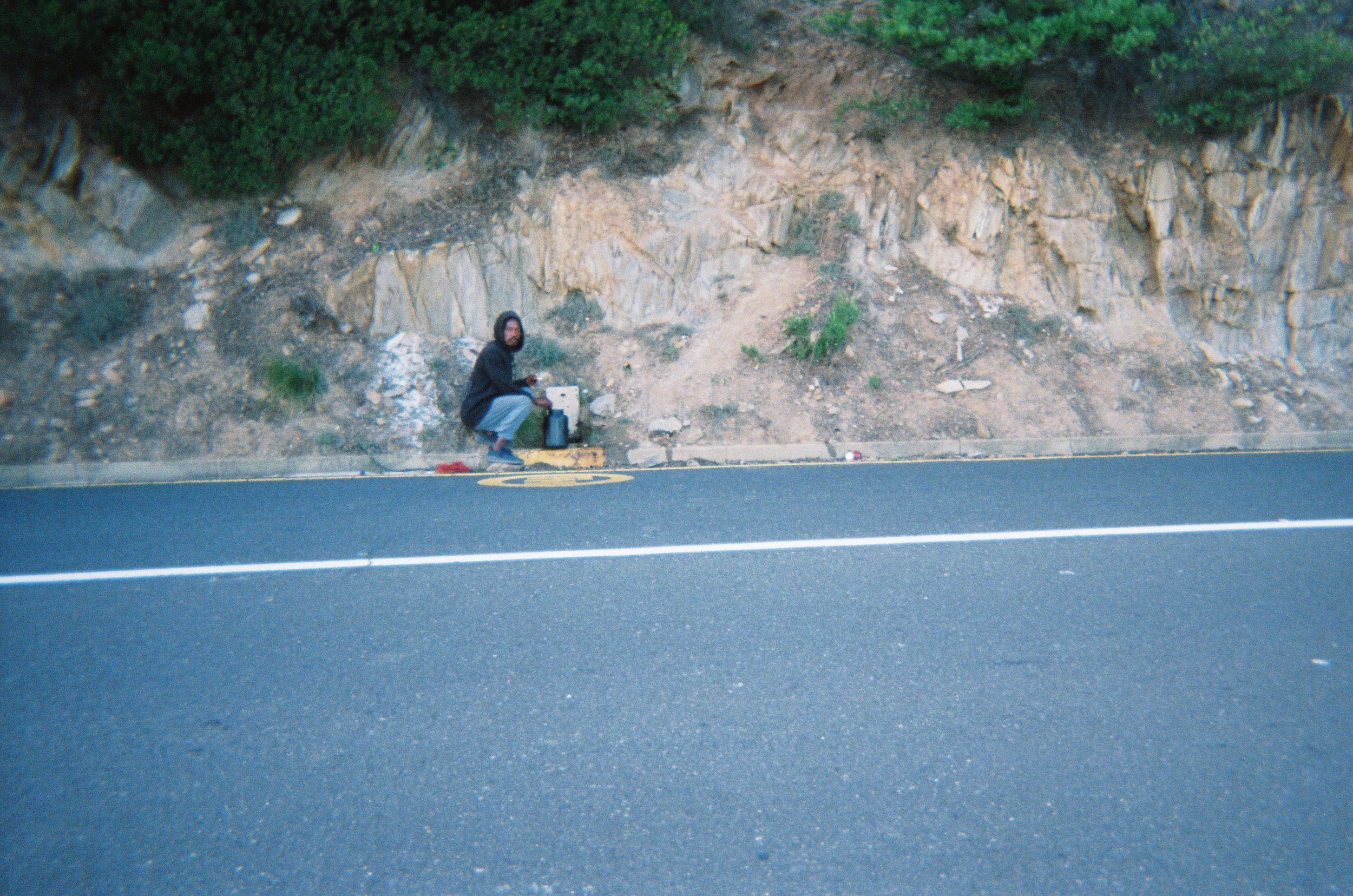
Ernest: Inside a road, you find grate or pothole, so when they use that day they cut the road, they need water to mix that day the material they came to use there. So now they open the tap there and they didn’t close properly so it is leaking just there in the valve, they keep the water outside, so now I found the water that day.

Colin: It’s not good. I’m getting stabbed not so long ago, it’s not nice, I don’t like it there.

Colin: Rain, flowers, water again.

Gideon: It’s called the Green Guest House, so now these people go to get the water to cook or to bath.

Colin: This is a water tank here, rain, catching rain. It’s water we can drink, it’s okay. It’s not 100% but it’s coming from rain so you can drink. The quality – there’s nothing wrong, clean water to drink and to wash, ja.

Gideon: That is the plan for now, to find a job and survive until then. If the opportunity shows itself you can take that but the thing is life after 6 weeks your appearance don’t look that good and if you try to go into places people look at you they can see something is not 100% right, so it makes you a bit self-conscious. It feels like you’re running out of time but what is time, we have to do it until it works out.

Colin: It’s just to sleep, there’s no house there for me to sleep, it’s just sleeping, in the morning, keep low, I don’t want people to see me homeless, I pack up everything. I’m coming here. In Pick ‘n Pay, I keep my money inside there, splash, wash.
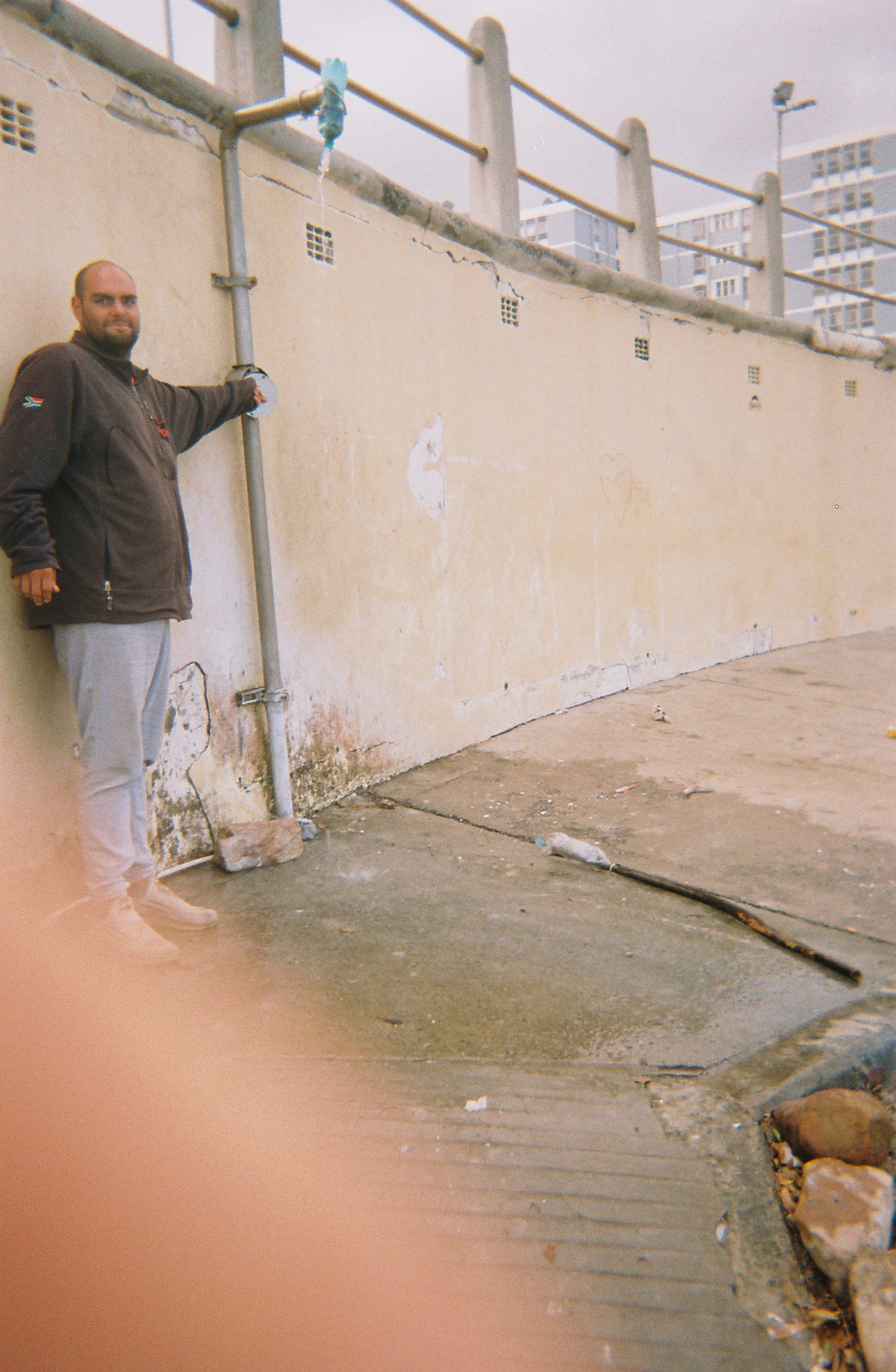
Gideon: So there’s people maybe showering there, and they use this tap for cooking water, bathing water, drinking water

Stanton: The guys are sitting. maybe it’s 6 o’clock, it’s not dark yet, we’re sitting there, we’re hungry, all sitting there watching the cars there, who’s gonna bring maybe bread, maybe something to eat. Here you can see the lights coming now it’s almost if we gonna sleep now.

Stanton: There was a time when there were maggots in the water, so the people didn’t drink tap water also. You will always see in my bag there’s always an empty bottle or something in my bag for water. Water is important. The one thing about a homeless person, you’ll always see him with a backpack. They say if you don’t have a backpack, you’re not homeless. I don’t know why.

Gideon: The people there stays in tents, and all of them collects water from this tap

Stanton: No, seriously, it’s not nice to, you sleep then it starts raining, you wet, otherwise you must cover yourself in plastic and stuff. It isn’t nice to cover your head in plastic, you get warm, you can’t breathe.

Stanton: It’s like this, wake up there, you can see how the people they make their beds like this out of cardboard, with blankets. Here’s the backpacks. Your backpack you must put next to them here, by their head side underneath something so at least you can feel when someone’s there by your head. It’s like you covered here by your head.
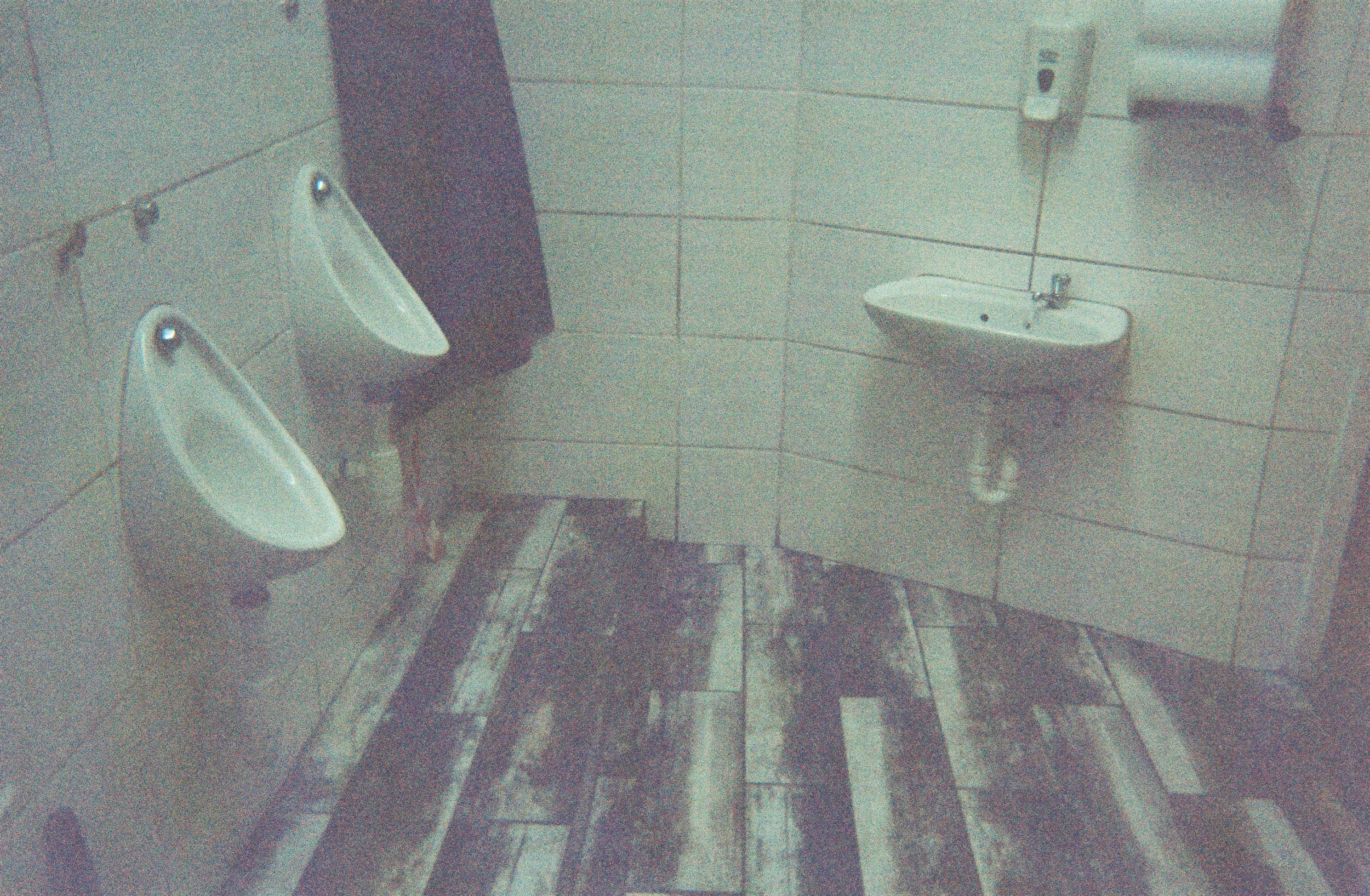
Stanton: How can I say, like wash wash - go in, like maybe you take your washing cloth, put soap on, and wash your face, splash maybe under their arms, quick quick, five minutes maybe then you can come out, understand? You must make it quick quick and don’t let the water go on the floor and stuff, if it looks untidy then they gonna be cross and they not gonna allow you again.
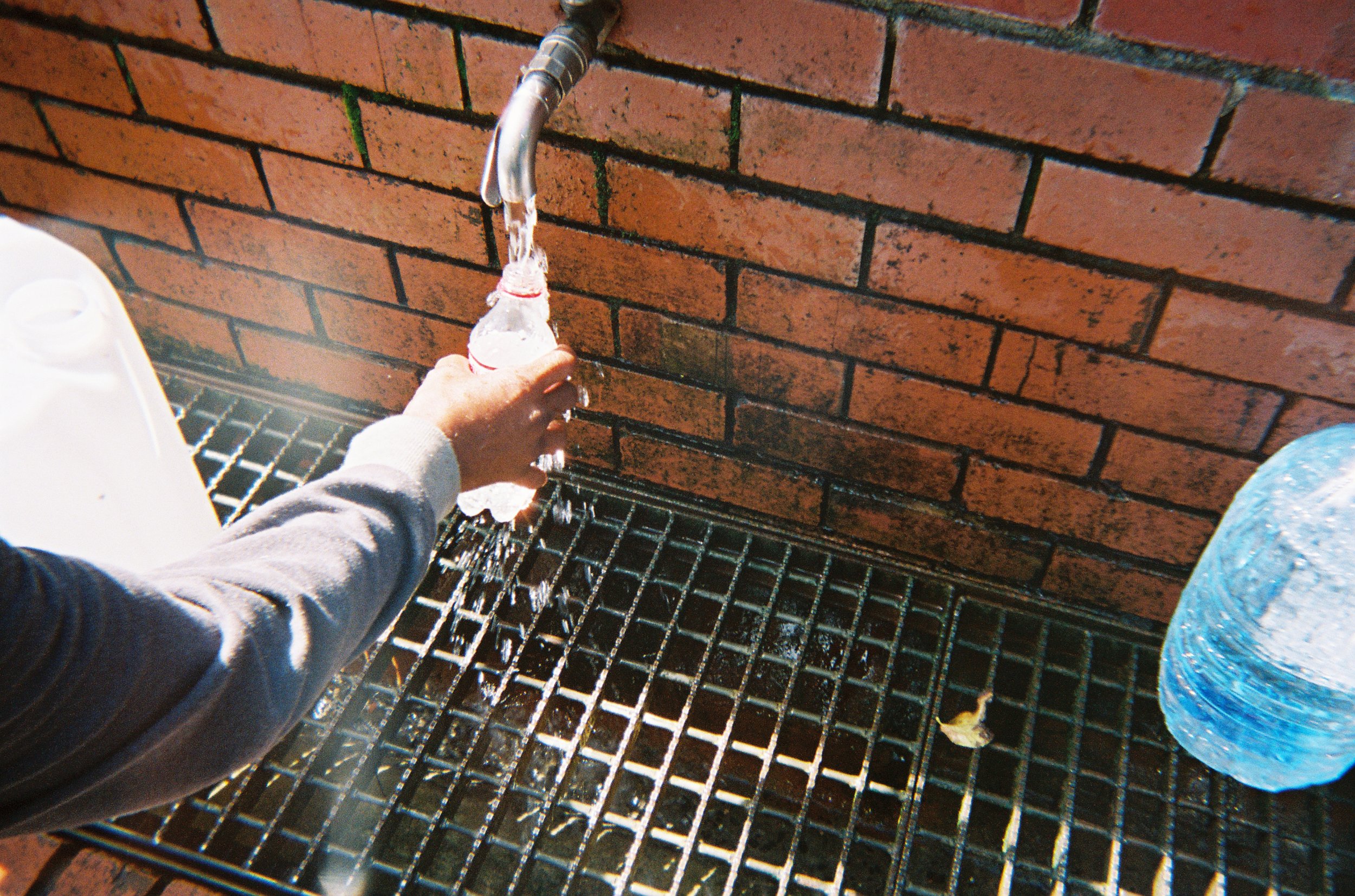
Stanton: Yoh, it’s the best water, serious. This is the same water they go buy in the shop, so we get it for free here. That’s why the people come, sometimes the people are standing in long lines.

Stanton: How can I say, if it’s a nice day and I feel okay, it’s fresh because, you see, one thing you realize if you homeless: you walk a lot, your shoes don’t last long, serious. I got boots now because sometimes I got a cheap takkie. A cheap takkie it breaks quick, man, so you must have like a solid shoe just to walk. You walk a lot, serious, because at the end of the day you must walk to get something, you must walk to get your water, you must walk to get food, everything you must do you must walk.

Portia: You can’t make the fire like during the day. You have to make the fire at night, around 7 o’clock when the public people are not in the community. You know, the people are walking up and down, and going to work, so you don’t want that. Otherwise, they will bring the law enforcement to our place and then they will take everything off you, all your clothes, your things, everything that we have, and they will throw it away.

Nicholas: It’s good to drink. Can drink it. But you can see it’s difficult to get the water in a bottle. And you can’t put that thing there, it doesn’t go.
Methodology – a research through photovoices
Participatory research premise is that people are experts in their lives, capable of staging fragments of their experience on a discursive and visual level. Like other participative methods, photovoice is particularly relevant to social issues concerning marginalised or voiceless populations: it allows them to explore an issue from their point of view and to discuss this theme.
3 participants were recruited through the NGO Viva con Agua, which provides showers in a bus located in the U-Turn association in Claremont, as well as the possibility to do their laundry. These services are offered in exchange for a voucher that can be acquired in different ways (working in an association and consulting with a social worker).
3 participants were be recruited through the NGO The Service Dining Rooms (SDR) based in the CBD of CT. The SDR is a Soup Kitchen that since 1935 has been serving meals every weekday to the poorest people in the CBD of CT. This is done in line with its mission statement to ensure that the most vulnerable people in the community are fed and cared for as a primary human right.
Participants were given a disposable camera with the following instructions:
Think about your daily life and all the moments which involve water: for example, when drinking, washing, cooking, doing the laundry…
- Where and how do you get it (e.g. do you buy it, trade it, find it at a source…)?
- How is water provided (in bottles, glasses, at a source, in the street…)?
- How do you judge the quality of it (is it good to drink, hot, cold, sufficient…)?
- What do you do with it: do you move it (how?), distribute it? sell it? share it and if yes, with whom?
- How do you keep it?
- How do you use it for?
Can you take pictures 1) of the place(s) where you find water and 2) of how you use it?
An information sheet and consent form have been signed by the participants. Participants were compensated.
They had about 24 hours each to take photos. Then the photos were developed and individual interviews were conducted (recorded and transcribed) with each participant around his or her photos. 6 photovoices, that are 3 to 6 minute videos that combine photos and interview excerpts from each participant, have been edited.
Main Results
The participants note the lack of access to drinking water in many places, the lack of public toilets and the lack of places to wash themselves and their clothes.
They get drinking water from public toilets, a police station they sleep next to (in Claremont), a store toilet, a large and unique fountain in CBD, churches, public taps, a spring water supply in Claremont (untreated), water tank catching rain, fire hydrant on the road. They fill bottles and containers and carry them away. Those who live together share the water.
Depending on where the water comes from, they consider it “cold, nice, fresh”(Stanton), “good to drink”(Nicolas), “not 100% but it’s coming from rain so you can drink”(Colin), “not good” (Ernest, Nicolas, Portia) “bad”(Ernest, Colin, Portia), , “dangerous”(Portia), “disgusting”(Gideon), “like sewage”(Ernest), one tells that once “there were maggots in the water, so the people didn’t drink tap”(Stanton). Get hot water “is a bit difficult”(Colin).
They wash themselves in public toilets (but “quick-quick” (Stanton) because it’s forbidden), in a river, in a canal (that access is now forbidden), in a public pool at night, in a garage that rent a space, in a unique public shower on the beach, in buckets they have at the public places where they live, in churches that provide buckets and water, and in the wash-bus Nina Manzi that provide showers.
They are careful not to leave any traces of water or dirt in the public toilets they use and to clean the place where they sleep every morning, for fear of being rejected. The public toilets are closed at night and far away from some spaces.
They wash their clothes in a river, in the canal that access is forbidden, on the beach, in buckets they have at the public places where they live, in a church and in Nina Manzi that provide spaces to do laundry. When they use public spaces to do the laundry and they don’t have the time to dry them or not other clothes, they “they walk wet wet, they let things dry” (Stanton) on them.
Make fire (for boiling water or cooking) in the public spaces is forbidden, but some of them do it anyway, for example “at night, around 7 o’clock when the public people are not in the community”(Portia) .
They sleep on cardboards on the pavement or in shacks/hoekkies, one in his car. Some of them have blankets or plastics but they are difficult to get. They’re afraid of being attacked or stolen. Under these conditions it is hard for some of them “to be sober”: “you’re getting cold, you can’t sleep, so they drink wine just to fall asleep, you don’t feel the coldness, they don’t fear, you see, if you use drugs, you have no fear in you”(Stanton).
But they try to live as well as possible: “I make myself feel like I’m at home when I’m a homeless person […] I have to make myself happy”(Portia); “Here is my place that I live, you see. Is a door here but when I pick up the plastic dampcourse, put it under the foundation, it’s a waterproof one”(Ernest); “It’s a struggle to look after three people if you don’t have any resources. So we are sticking together, just loving each other and surviving” (Gideon).
Requests
“If I were the town mayor, what would you ask me?”
“Maybe I can ask you, like a mayor, I can ask you maybe things like I don’t have clothes to wear, I don’t have work to work, I don’t have many things, so that I can meet with you. And I know you are a mayor, you can help me with work, you can help me with food, you can help me with whatever I want, but that you can help me. But I know to meet with me it is not easy.” (Ernest)
“I think at the moment they’re doing what they can. I suggest all homeless people who get the offer of a shelter, take it, because in six months’ time they going to do something, they going to put the people either in jail or something. Me also, I go there. I must go to a shelter.” (Colin)
“It’s not an easy thing to say to the mayor about a homeless thing but like I say, we have different human rights, we have human rights that are the same as the people in the houses and then there’s homeless human rights. Like the water one, is a human right that we can go to spring, they don’t stop us going to spring, we are welcome at spring, so we are grateful from that.” (Portia)
“Well, you are the mayor, I will ask you Can’t you maybe put for us there maybe one tap at least, understand? Then you don’t need to walk so far and stuff. You can’t put maybe a brass or stainless steel because they gonna steal it off, if it’s open out there, because it’s money. A plastic one is alright because they still gonna leave it there.” (Stanton)
“By the police there is also a toilet inside but the police they say No no no, go the other place. Okay, maybe sometimes there’s a good policeman there he allows you in, but I understand also the reason why they so, because there’s more than 50 people that sleep there” (Stanton)
“What would I ask a mayor like you? I need a house, that’s all, cos a person on the street needs a house. But the funny thing is some people are not desperate because they do get houses and then they sell it again and they go back to the streets. So, a person on the street needs a house, maybe a place where he can obtain skills and get a job and that’s it. So, it’s more houses for people on the street, that’s all. Cos other people do not agree with shelters, you see.” (Nicolas)
“Some public toilets are not accessible at night. So, like at the post office we don’t have public toilets there, so we drink water, we urinate around the corner, we sit around the corner which is… so it’s his problem. I don’t know, the only solution for me is a house, a house for people.” (Nicolas)
“A place where you’re safe, a place that where you know you can put maybe R100 next to your head, maybe you go somewhere you can come back maybe the R100 will still be there, you see. Maybe a place to come in just without your shoes or lay without worrying what is going to happen next.” (Stanton)
Team and institutions
Researchers:
Alberto Caoci
Helene Martin
Project participants:
Colin
Ernest
Gideon
Nicolas
Portia
Stanton
Interviews transcriptions:
Jill Goldberg
Many thanks for the support during the research to Hilton Adams, Karen Cain, Martin Lourens, Phumelele Muthali, Hakeem Murray
Viva con Agua – Nina Manzi Wash Bus
The Service Dining Rooms
HETSL, University of Applied Sciences of Western Switzerland

